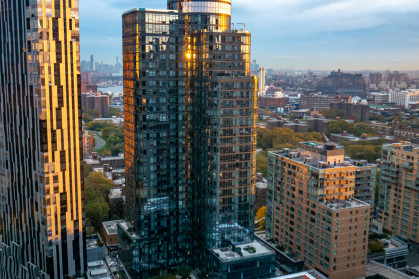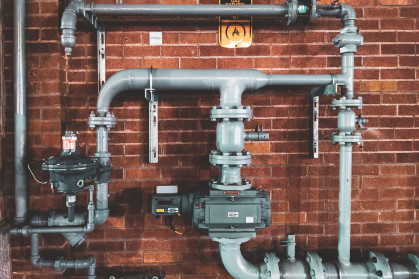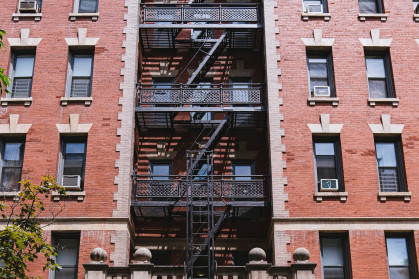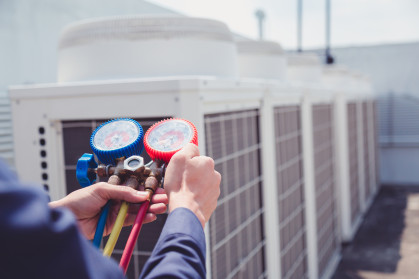New Jersey passed a law requiring condo and co-op buildings to conduct reserve studies. Could New York be next?
- A reserve study assesses a building's physical components and funds in reserve for major repairs
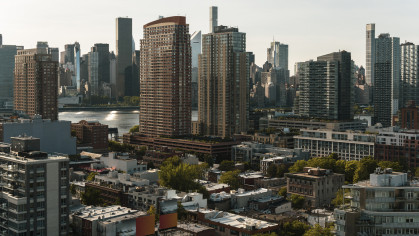
Mandating a reserve study makes sense in NYC, where many buildings must upgrade to comply with numerous local laws.
iStock
New Jersey enacted new legislation that takes a big step toward protecting the structural and financial health of condo and co-op buildings. A key component of the law—a reserve study mandate—is something that New York City buildings should put on their radar, sources tell Brick.
The goal of the law, signed last month by Governor Bill Murphy, is to prevent another building tragedy like the June 2021 Surfside condo collapse. Florida also implemented state-wide inspection requirements in response to the catastrophe, caused by a severe lack of structural maintenance.
The New Jersey legislation includes new rules for building inspections and the requirement for building associations to conduct a reserve study goes beyond the measures that New York has in place for its co-op and condo buildings. (Thanks to NYC’s local laws, buildings already undergo a thicket of façade, parapet, and building garage inspections.)
What is a reserve study?
A reserve study assesses the state of a building’s physical components and determines whether it has enough funds in reserve to pay for major repairs or replacements, like a new heating system or roof. Only a small percentage of NYC buildings carry them out, and while experts recommend doing them every three to five years, some buildings wait as long as 10 years, which means they are dealing with potentially outdated information.
Another goal of doing a reserve study: to move away from relying on emergency assessments, which is how many buildings pay for upgrades. New pressure to electrify buildings and comply with lending and insurance regulations also necessitates the need for appropriate levels of reserve funds, sources tell Brick.
Lifting up the carpet
Boards are disincentivized to conduct reserve studies because these reviews often identify the need for additional expenditures, which can hurt unit prices, says Stephen A. Varone, president at RAND Engineering & Architecture. That’s why mandating a reserve study and lifting up the carpet is a necessity, he adds. (Rand conducts building reserve studies.)
“As a shareholder or owner, how do you force your board to do repairs and keep on top of things—and find the money? This is how you do it,” Varone says. He points to Local Law 11, the façade inspection law, which was implemented in 1998 after a partial building collapse the previous year.
“How many buildings have had their facade inspected compared to before the law?” he asks. There was pushback when the law was introduced that argued NYC building code meant buildings were supposed to be kept in good condition, but only when fines were implemented for non-compliance did real change occur, he says.
The difference is like “night and day,” Varone says. “The condition of NYC building facades is far better today because of the inspection requirement."
No more kicking the can
Orest Tomaselli, president of the project approval division at CondoTek, which provides data on condos for lenders, and the CEO and president of Strategic Inspections, which conducts co-op and condo building reserve studies, also sees growing demand for reserve studies. The Florida condo collapse “changed the condo lending and managing world,” he says.
"You can no longer get away with kicking the can down the road in terms of repairs and saving money to pay for them,” he says.
He says he’s not surprised that New Jersey implemented this legislation; he’s only surprised that New York has not. He could see a similar law being put in place soon.
So many buildings are “woefully unfunded” and operate under special assessments, he says. (Curious about your building’s needs? His firm is offering free mini evaluations.)
“Only in the last two to three years have we seen a desire from boards to set aside appropriate funding for capital projects,” he says, estimating that less than 5 percent of NYC condo buildings have conducted a reserve study. The cost of a study can start at $8,000 to $12,000 for small buildings.
“Cheap, preventative maintenance,” he calls it. "There’s no reason not to do it.” That’s especially true in NYC, which has a multitude of local laws and regulations, he adds.
All signs point to a reserve study mandate
“Lots of buildings are not professionally managed, and there’s so much going on,” Tomasselli says. “What’s last on the list but should be higher is lending compliance.”
Lending guidelines from Fannie Mae and Freddie Mac require condo buildings to put 10 percent of their operating budget toward a reserve fund each year. Buildings that fail to do so end up on a “do not lend list,” which means buyers can’t get conforming loans. Some banks have adopted similar guidelines as well.
And some NYC buildings are cash-only, and buyers there can be in the dark about whether the building is prepared to fund major capital repairs, he adds.
Insurance companies are seeing more claims arising from deferred maintenance, but if a building presents a reserve study and shows the building is in good working order and they have the capital to handle repairs, “not only are they offered a policy but they can lower their insurance costs,” Tomaselli adds.
“All roads are leading to buildings setting aside capital for reserve funds through a reserve study,” he says.
Sign Up for our Boards & Buildings Newsletter (Coming Soon!)
Thank you for your interest in our newsletter. You have been successfully added to our mailing list and will receive it when it becomes available.


















